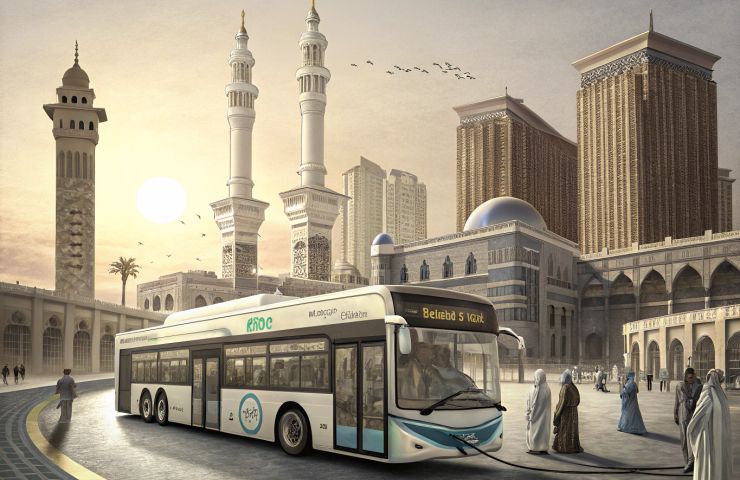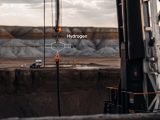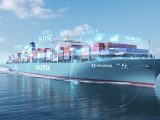
Hydrogen Fuel Cell Buses Tested in Makkah in Saudi Push Toward Zero-Emission Mobility
May 6, 2025Makkah, Saudi Arabia — Here’s something you don’t see every day: a sleek, quiet hydrogen fuel cell bus gliding through the bustling streets of one of the world’s most sacred cities. But that’s exactly what’s happening in Makkah right now, where a groundbreaking clean transportation trial is turning heads — and steering toward a zero-emission future.
This is the second phase of a real-world test that’s putting hydrogen buses to the ultimate test — hot climate, heavy foot traffic, and non-stop movement. The project is a joint effort between Abdul Latif Jameel Motors, Toyota Motor Corporation, and CaetanoBus, and it’s redefining what clean public transport can look like in extreme conditions.
Why Makkah, and Why Now?
If you’re wondering why this all started in Makkah — the answer’s simple: there’s no better place. Over 20 million people travel here every year, and moving them around efficiently, minus the pollution, is top priority. It’s all part of Saudi Arabia’s bigger picture — their Vision 2030 plan, which targets a 25% cut in emissions from the transport sector by decade’s end.
Testing zero-emission technology like hydrogen buses under Makkah’s intense heat and relentless pace makes it one of the toughest proving grounds out there. And if these buses can make it work here, chances are they can perform just about anywhere.
What’s Powering These Buses?
The stars of this trial are the Caetano H2.City Gold buses — powered by Toyota’s hydrogen fuel cell system. They run on a technology called proton-exchange membrane fuel cells, which turn green hydrogen into electricity. The only emission? Water vapor.
Each bus can go up to 400 kilometers on a single tank and can refuel in under 10 minutes — a game-changer in high-demand transit environments. If the engine sounds familiar, it’s because it’s the same core technology that powers the Toyota Mirai, the company’s flagship hydrogen car introduced back in 2014.
Teamwork That Fuels Innovation
Abdul Latif Jameel Motors, a longtime partner and distributor for Toyota in Saudi Arabia, has grown beyond cars into a major player in mobility and sustainability. Their involvement isn’t just business — it’s a reflection of Saudi Arabia’s strategy of weaving industrial decarbonization into its economic transformation.
Toyota brings decades of R&D in hydrogen fuel cells to the table, leaning into its belief that there isn’t just one path to carbon neutrality. Meanwhile, CaetanoBus, a Portuguese company that specializes in green mobility, delivers the know-how to make these buses functional, efficient, and fit for real-world deployment. Together, they’re building more than buses — they’re shaping the future of transit.
More Than Just Wheels on the Road
This trial isn’t just about vehicles — it’s about the whole ecosystem. That includes brand-new hydrogen infrastructure, like refueling stations popping up to support the buses. It also means training emergency responders in hydrogen safety procedures, ensuring Makkah is prepared from every angle.
From logistics and safety to fueling and performance, this initiative is building a fully integrated model for what a clean hydrogen-powered transport system looks like in action.
Hydrogen vs. Batteries — Testing the Limits
While it’s not being billed as a head-to-head competition, there’s definitely a side-by-side comparison happening between hydrogen fuel cell buses and battery electric buses. The harsh environment of Makkah — think soaring temps and long-duty cycles — puts every green technology to the test.
In situations where extended range, fast refueling, and heavier payloads matter most, hydrogen has a solid edge. But this trial is about gathering solid, on-the-ground data that’ll guide future clean transport policy and infrastructure across Saudi Arabia.
What This Means for the Bigger Picture
Saudi Arabia’s story has always been tied to energy. But now, the country’s writing a new chapter — one led by green hydrogen, renewables, and high-tech fuel production. It’s a shift from being just an oil giant to becoming a leader in industrial decarbonization, clean mobility, and hydrogen innovation.
The Makkah trial isn’t just a one-off project; it’s part of a strategic move to transform Saudi Arabia into a global hydrogen hub, using its rich solar resources and growing know-how in electrolysis technology to make that a reality.
Where Things Go from Here
There’s something fitting about kickstarting this effort in Makkah — a city of movement, purpose, and transformation. And honestly, the old saying rings true: “If it works here, it’ll work anywhere.”
At its core, this trial is more than just about buses, batteries, or engines — it’s about proving whether hydrogen can be a reliable, scalable solution when the pressure’s on and the demand is real.
So far? It’s looking like the future’s not just sustainable — it’s already on the road.



 With over 15 years of reporting hydrogen news, we are your premier source for the latest updates and insights in hydrogen and renewable energy.
With over 15 years of reporting hydrogen news, we are your premier source for the latest updates and insights in hydrogen and renewable energy.